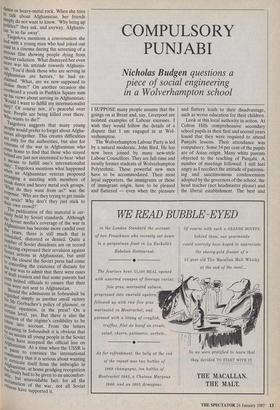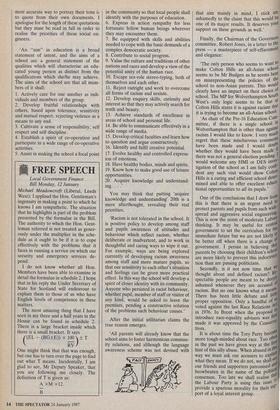COMPULSORY PUNJABI
Nicholas Budgen questions a
piece of social engineering in a Wolverhampton school
I SUPPOSE many people assume that the goings on at Brent and, say, Liverpool are isolated examples of Labour excesses. I wish they would follow the details of a dispute that I am engaged in at Wol- verhampton. The Wolverhampton Labour Party is led by a natural moderate, John Bird. He has now been joined by many new-style Labour Councillors. They are full-time and mostly former students of Wolverhampton Polytechnic. These powerful new men have to be accommodated. Their most loyal supporters, the immigrants or those of immigrant origin, have to be pleased and flattered — even when the pleasure and flattery leads to their disadvantage, such as worse education for their children.
Look at this local authority in action. At Colton Hills comprehensive secondary school pupils in their first and second years found that they were required to attend Punjabi lessons. Their attendance was compulsory. Some 54 per cent of the pupils are of Asian origin. Many white parents objected to the teaching of Punjabi. A number of meetings followed. I still feel angry as I recollect the attitude of patronis- ing and sanctimonious condescension adopted by the governors of the school, the head teacher (not headmaster please) and the liberal establishment. The best and most accurate way to portray their tone is to quote from their own documents. I apologise for the length of these quotations but they must be read in full in order to realise the priorities of these social en- gineers.
`An "aim" in education is a broad statement of intent, and the aims of a school are a general statement of the qualities which will characterise an edu- cated young person as distinct from the qualifications which she/he may achieve. The aims of the school are that all mem- bers of it shall: 1. Actively care for one another as indi- viduals and members of the group.
2. Develop fruitful relationships with others, based upon tolerance, sensitivity and mutual respect, rejecting violence as a means to any end.
3. Cultivate a sense of responsibility, self respect and self discipline.
4. Establish a spirit of co-operation and participate in a wide range of co-operative activities.
5. Assist in making the school a focal point in the community so that local people shall identify with the purposes of education.
6. Express in action sympathy for less fortunate fellow human beings wherever they may encounter them.
7. Be equipped with skills and abilities needed to cope with the basic demands of a complex democratic society.
8. Contribute to social progress.
9. Value the culture and traditions of other nations and races and develop a view of the potential unity of the human race.
10. Escape sex-role stereo-typing, both of themselves and each other.
11. Reject outright and work to overcome all forms of racism and sexism.
12. Develop enquiry skills, curiosity and interest so that they may actively search for truth and beauty.
13. Achieve standards of excellence in areas of school and personal life.
14. Be able to communicate effectively in a wide range of media.
15. Develop critical faculties and learn how to question and argue constructively.
16. Identify and fulfil creative potential.
17. Evolve healthy and controlled express- ion of emotions.
18. Have healthy bodies, minds and spirits.
19. Know how to make good use of leisure opportunities.
20. Acquire knowledge and understand- ing. .
You may think that putting 'acquire• knowledge and understanding' 20th is a mere afterthought, revealing their real priorities.
`Racism is not tolerated in the school. It is positive policy to develop among staff and pupils awareness of attitudes and behaviour which reflect racism, whether deliberate or inadvertent, and to work in thoughtful and caring ways to wipe it out. For example, ways are being explored currently of developing racism awareness among staff and more mature pupils, so that our sensitivity to each other's situation and feelings can be given more practical effect. In this way the school will develop a spirit of closer identity with its community. Anyone who persisted in racist behaviour, whether pupil, member of staff or visitor of any kind, would be asked to leave the premises, pending a constructive solution of the problems such behaviour causes.'
After the initial utilitarian claims the true reason emerges.
`All parents will already know that the school aims to foster harmonious commun- ity relations, and although the language awareness scheme was not devised with that aim mainly in mind, I stick un- ashamedly to the claim that this would be one of its major results. It deserves your support on these grounds as well.'
Finally, the Chairman of the Governors committee, Robert Jones, in a letter to the press — a masterpiece of self-effacement and elegance: `The only person who seems to want to make Colton Hills an all-Asian school seems to be Mr Budgen as he seems bent on misrepresenting the policies of the school to non-Asian parents. This would clearly have an impact on their choice of school. The MP for Wolverhampton South West's only logic seems to be that as Colton Hills states it is against racism that it is trying to become an all-Asian school.
`As chair of the Pre-16 Education Com- mittee, if there is a single school l° Wolverhampton that is other than against racism I would like to know. I very much regret that these mischievous comments have been made and I would doubt whether they would have been made if there was not a general election pending. I would welcome any HMI or DES inves- tigation of the school as I am fully cm& dent any such visit would show Colton Hills is a caring and efficient school deter' mined and able to offer excellent eduea. tional opportunities to all its pupils.'
One of the conclusions that I draw from this is that there is an urgent need t° protect parents and pupils from such wide' spread and aggressive social engineering. This is now the norm of moderate UN°, thinking. It may be useful for central government to set the curriculum for the immediate future but we are not likely tef be better off when there is a change °t government. I persist in believing that parents by choosing their children's sale° are more likely to prevent this indoctriar tion than are passing politicians. Secondly, is it not now time that vie thought about and defined racism? ge: spectable people are meant to be deePi, f ashamed whenever they are accused racism. But no one knows what it meat There has been little debate and little proper opposition. Only a handful of w voted against the last Race Relations Aft ,, in 1976. In Brent when the proposal introduce race-equality advisers was fi wt rs made it was approved by the Conserve. tives. It is about time the Tory Party becont., more tough-minded about race. Too often in the past we have given way at the fiat hint of this silly abuse. When abused in tins way we must ask our accusers to explain what they mean. If we do not, we shall see. our friends and supporters patronised an j browbeaten in the name of the politic't consensus. Too late we shall realise Old the Labour Party is using this issue t° provide a spurious morality for their Or port of a loyal interest group.



















































 Previous page
Previous page